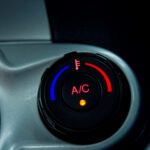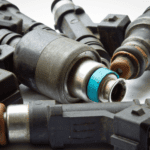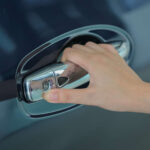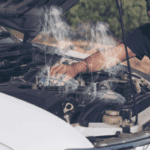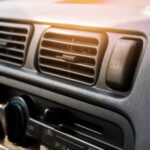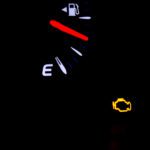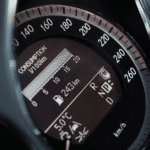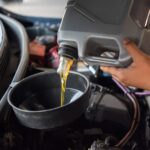Picture this, you’re driving at a constant speed, the sun is shining, and the car is driving well for a moment. But a sudden jerking feeling robs away this joy. This peaceful journey turns into a bumpy ride, you’re not doing anything wrong, and the road is smooth, so you start to wonder what might have caused it.
A car that jerks at a constant speed usually means the engine is misfiring, typically due to a fuel or air supply issue. A specific sensor or engine auxiliary commonly causes this. However, in some cases, transmission can be the root cause.; more on this below.
12 Reasons Why a Car Jerks When Driving at Constant Speed?
A car is a complex machine made up of numerous interconnected components. Therefore, a problem can result from a faulty part or a combination of issues caused by one defective part.
Throttle cable issue
The throttle cable is the link between you and your car’s engine. When you press down on the accelerator pedal, the cable moves the throttle body’s valve (plate) to allow more air and fuel into the engine, increasing the engine’s speed.
This isn’t a common cause, but one to be aware of. Over time, the cable can fray or stretch, which affects its smooth operation. It may stick or bind, leading to a jerky response from the engine when you press the gas pedal.
If you can imagine, the cable is no longer under any tension because it is stretched. So when you press the gas pedal, the cable is moving around. This means the air and fuel being drawn into the engine constantly changes when they shouldn’t, even if holding the gas pedal perfectly still. When the cable becomes problematic, you will also notice that the car’s miles per gallon keep declining, and the gas pedal may become stiff.
Faulty carburetor
In vehicles with a carbureted engine, the carburetor mixes air and fuel in the correct ratio for combustion. An uncalibrated, broken, or dirty carburetor will not mix the fuel and air in the right quantities, which produces either a rich (too much fuel, not enough air) or lean (too much air, not enough fuel) mixture.
Both scenarios can lead to erratic engine operation and cause your car to jerk while driving, even when holding the car at a constant speed. In this case, the overall engine’s performance is poor, and you’ll notice a decrease in the car’s fuel efficiency.
The internals of a carburetor is reasonably complex; a failed carb can be caused by the tiniest of issues within the float chamber, jets, the mixture screw, or gaskets and seals. Solving the issue can sometimes be a simple job of re-jet and setting up the carbs, but this requires professional assistance.
Dirty fuel injector
Fuel injectors spray a mist of fuel into the engine’s cylinders, where it is mixed with air and combusted. Dirt, debris, or build-up can clog the injector’s nozzle and disrupts its spray pattern. Consequently, the injector’s ability to deliver the right amount of fuel is affected.
As the engine struggles with inconsistent fuel delivery, you may experience jerking or stuttering while accelerating or excessive smoke from the exhaust while driving at a constant speed.
Several factors can cause a blockage in a fuel injector; the most common include:
- Low-quality or contaminated fuel
- Deposits from fuel additives
- Carbon build-up from incomplete combustion
- Moisture or water in the fuel
- Rust particles or debris from the fuel tank
- Fuel pump malfunction
- Use of improper fuel or octane rating
- Engine oil contamination
- Fuel line blockage or restrictions
- Extended periods of vehicle inactivity
- Neglecting to change the fuel filter
Although fuel additives can cause the problem, a good quality fuel additive can also cure the issue. Not using them frequently is important because this is why problems occur. However, replacing or having the injectors ultrasonically cleaned will be your only choice if a fuel additive doesn’t solve the issue.
Malfunctioning mass air flow (Maf) Sensor:
The MAF sensor measures the air entering the engine, which is necessary for the ECU to calculate how much fuel the engine needs for optimal combustion.
If the sensor is faulty, dirty, or damaged, it can send incorrect information to the engine’s control unit. This misinformation can cause an improper fuel-to-air ratio, leading to unbalanced engine operation and a jerky ride. The most common causes of failed MAF sensors are failing to change the air filter leading to dirt, grime, oil, and debris contaminating the sensor. Age and wiring-related defects can also cause the MAF sensor to fail.
You can diagnose it through its error P0101 if you connect the vehicle to a code reader or if you remove the MAF sensor and run the engine; you can confirm it is faulty as it will idle smoothly. Simply removing, cleaning, and refitting the sensor may solve the issue; however, they are relatively cheap to replace if that doesn’t work.
Clogged air intake
The air intake system allows air into the engine for combustion. However, an air filter clogged with dirt or debris can block the airflow.
A blockage will disrupt the proper air-to-fuel ratio, which can cause combustion problems in the engine. Most commonly, the engine runs too rich because the engine is being strangled. This scenario often manifests as a rough-running engine or a jerking sensation when driving.
Another thing to be aware of is that an air intake issue isn’t just limited to an air filter problem; a combination of air intake hoses can fail and crush, restricting airflow or getting blocked with debris.
Transmission issues
The transmission converts power from the engine to drive at the wheels. There are multiple components and sensors which depending on the transmission type, can cause the car to jerk when driving along.
They include:
- Transmission slipping – If the transmission slips out of gear momentarily or fails to engage properly, it can cause the car to jerk as the power delivery to the wheels becomes inconsistent. This can be caused by a worn clutch or internals of the transmission.
- Worn or damaged transmission components – Components such as the clutch, torque converter, or gears within the transmission can wear out or become damaged over time, leading to jerking motions during driving.
- Low transmission fluid level – A low transmission fluid can cause damage to gear teeth and cause the temperature inside the transmission to rise. Damage to rotating components will give you a rough driving experience.
- Transmission solenoid problems – Malfunctioning or failing transmission solenoids, which control the flow of transmission fluid, can cause rough shifting and jerking while driving.
- Faulty torque converter – Issues with the torque converter, such as lock-up clutch problems or a malfunctioning stator, can cause the car to jerk when driving at a constant speed.
- Transmission control module (TCM) issues – The TCM controls various aspects of the transmission. If the TCM malfunctions or receives incorrect signals, it can lead to jerking movements while driving.
- Gear or synchronizer problems – Worn or damaged gears or synchronizers within the transmission can result in improper gear engagement and cause the car to jerk alongside unusual noises.
To determine the transmission is causing the issue, listen for unusual noises, specifically when changing gears. Repairing a transmission fault is more complex and requires removal. It’s rather tricky to do this on the drive at home, so I recommend having a mechanic inspect a transmission fault for you.
Spark plugs problems
Spark plugs initiate the combustion process through a spark. But plugs don’t last forever. They age, and the tips erode with time, which produces a weak and inconsistent spark. This can result in minor engine misfires, meaning the engine will jerk. Because of an inconsistent spark, this is most noticeable when driving at a constant speed.
Another issue spark plugs can face when they become fouled; this means the tip of the plug is wet. Usually, this is caused by overfilled engine oil or a leaking piston ring. But either way, if you remove the spark plug and it’s covered in oil, it will struggle to provide a spark to the fuel, again causing an engine misfire. I wouldn’t recommend wasting your time cleaning contamination from spark plugs; replace them.
Failing coil pack
A coil pack converts low-voltage battery power into high-voltage electricity needed to generate a spark in the spark plugs. When coil pack internals fail, one of the coils usually begins to break down with age, which means the spark plugs generate a weaker spark.
Typically when a coil pack fails, the engine misfire will be horrible, and the check engine light will illuminate on the dashboard. However, when they begin to fail, you will notice the engine running rough, especially when driving along at the same speed.
When replacing a coil pack, it’s also good practice to replace the plugs simultaneously; they will have been exposed to irregular voltages supplied by the failing coils, so they typically fail soon after replacing a coil pack.
Clogged catalytic converter
The catalytic converter is an exhaust emissions control device that reduces harmful gases and pollutants from your car’s exhaust by converting them into safer gasses.
A failing catalytic converter may experience partial blockage or restricted flow of exhaust gases. This can disrupt the engine’s performance and cause intermittent jerking sensations while driving due to a build-up of exhaust back pressure. Commonly catalytic converters get clogged due to excessive soot or unburnt fuel particles. Depending on how bad the blockage is, it may be possible to clear it with a suitable fuel treatment, or sometimes they can unclog themselves. But usually, they will need replacing.
Fuel line blocked or damaged.
The fuel lines serve as veins for fuel to travel from the tank to the engine. If these lines develop tiny cracks with age, become partially blocked or get damaged from debris. You can get inconsistent fuel pressure or a reduction in fuel reaching the engine.
When the engine can’t get the right amount of fuel at the right time, it can cause the engine to stutter while driving. Blockages are usually caused by contaminants from poor-quality fuel or debris in the fuel tank being drawn through the fuel lines and causing a build-up. Another cause of blockage is failing to change the fuel filter regularly, which also clogs up and creates a fuel flow restriction.
Worn motor mounts
The motor mounts connect the engine to the chassis, restricting excessive movements and absorbing engine vibrations. Worn motor mounts are most noticeable as a shake when switching off the engine. However, when motor mounts are terrible, you can always feel the vibrations with the engine running regardless of your speed.
Checking motor mounts is very easy; with the engine off, if you can rock the engine and it moves a lot, the mounts are most likely worn; you may also hear them knocking.
Damaged engine internals
A car engine has multiple spinning components, crankshaft, camshaft, and bearings. Most are lubricated and protected by engine oil.
If consistently running an engine low on oil, damage can be caused due to the rise in friction with an engine. You may feel issues like vibrations, shaking, or humming noises rather than jerking when driving, especially when holding constant speeds. Unfortunately, these problems generally involve stripping down the motor and measuring each component to find the cause. Not a cheap repair!
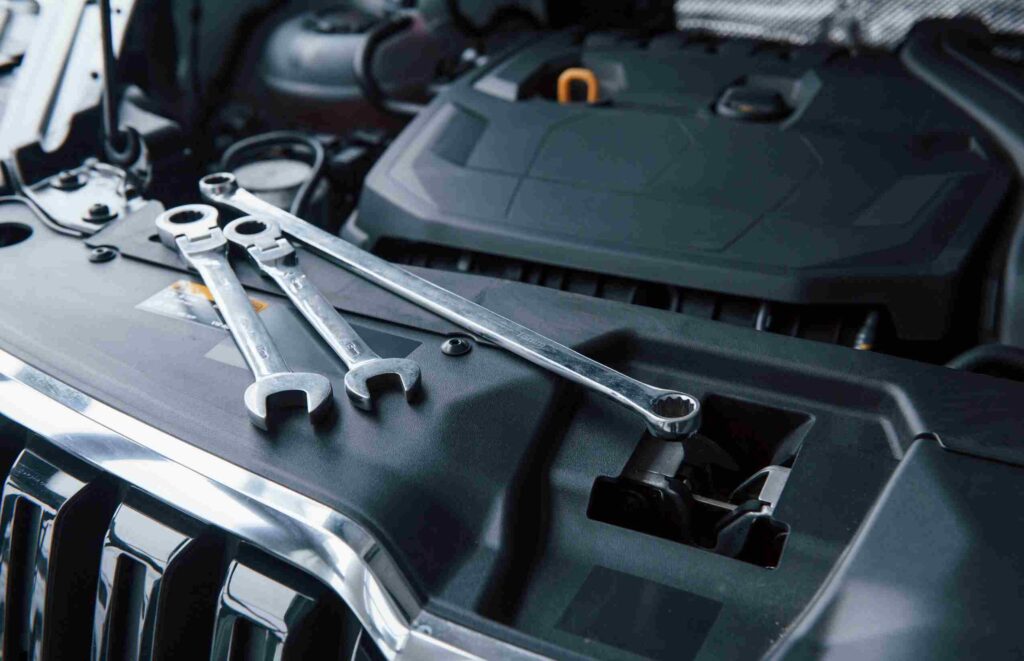
How to Diagnose a Car That Jerks When Driving at Constant Speed?
The necessary fix depends on the correct diagnosis, and I hope you can easily do that based on the symptoms I mentioned in the early sections. Not all of the above is diagnosable just by looking and may require a more detailed inspection if you are wondering why they are missing. The following steps might help find the cause and rectify it:
- Check the condition of spark plugs and replace them where necessary.
- Locate air and fuel filters to see any signs of a blockage. Clean or change those filters as required.
- Check the transmission fluid level (automatic transmission specific). If it’s low, try changing or topping it up.
- You can repair a faulty carburetor, but it may need professional hands and experience setting up a carb correctly.
- Most of the other causes can be checked with an OBDII scanner. You may need to replace a defective sensor. In this case, the MAF sensor needing cleaning or replacing is the most common.
- Check the exhaust for any signs the catalytic converter is blocked. When the engine runs, it will glow or have a blueish tint when cold.
- If you are unable to determine the cause, next consult a mechanic. The other issues are very hands-on and may be difficult to diagnose without experience.
Can I Drive a Car Which Jerks at Constant Speed?
Yes, you can, but I don’t recommend it. Although the issues may seem simple and everything can be fixed, your continuous driving could increase the chances of more damage happening to your vehicle.
For instance, if your car continuously jerks, it could get bad enough that you lose control at high speed, or the engine may shut off while driving, endangering yourself and other people on the road.
What Causes an Automatic Transmission Car to Jerk at Constant Speed?
In cars with an automatic transmission, jerking is often caused by transmission fluid-related issues. An automatic transmission makes use of hydraulic fluid and pressure to change gears. When the force needed to change gears is not right, it may struggle to engage or hold gears in place, which can cause a nasty jerking sensation when driving at a continuous speed.
Final Words
Understanding why your car jerks when driving at a constant speed and identifying the underlying cause is the first step toward ensuring a smoother driving experience.
This issue could stem from various factors – from a faulty accelerator cable to transmission issues or something as small yet significant as a clogged injector or air intake.
Although diagnosing and often fixing these issues yourself is possible, don’t hesitate to consult a professional.
